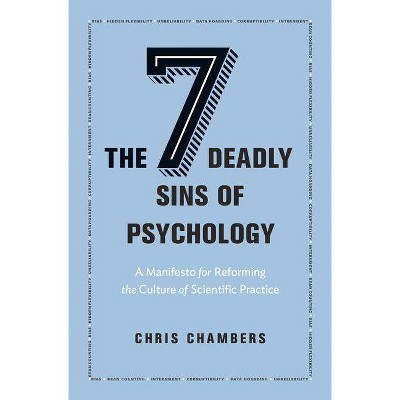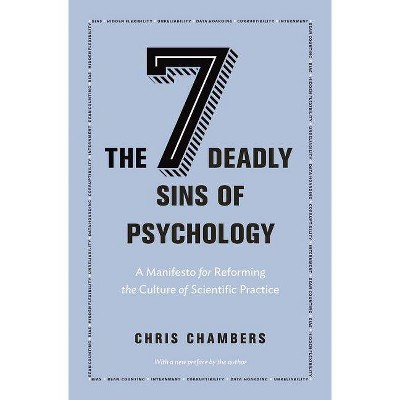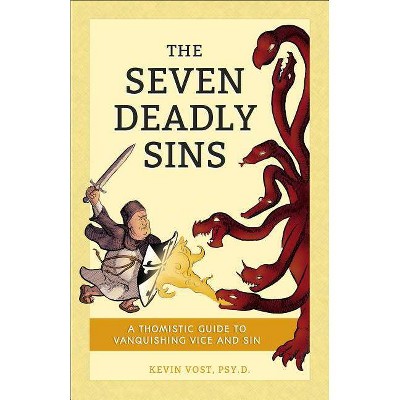The Seven Deadly Sins of Psychology - by Chris Chambers (Hardcover)

Similar Products
Products of same category from the store
AllProduct info
<p/><br></br><p><b> Book Synopsis </b></p></br></br><p><b>Why psychology is in peril as a scientific discipline--and how to save it</b> <p/>Psychological science has made extraordinary discoveries about the human mind, but can we trust everything its practitioners are telling us? In recent years, it has become increasingly apparent that a lot of research in psychology is based on weak evidence, questionable practices, and sometimes even fraud. <i>The Seven Deadly Sins of Psychology</i> diagnoses the ills besetting the discipline today and proposes sensible, practical solutions to ensure that it remains a legitimate and reliable science in the years ahead. <p/>In this unflinchingly candid manifesto, Chris Chambers draws on his own experiences as a working scientist to reveal a dark side to psychology that few of us ever see. Using the seven deadly sins as a metaphor, he shows how practitioners are vulnerable to powerful biases that undercut the scientific method, how they routinely torture data until it produces outcomes that can be published in prestigious journals, and how studies are much less reliable than advertised. He reveals how a culture of secrecy denies the public and other researchers access to the results of psychology experiments, how fraudulent academics can operate with impunity, and how an obsession with bean counting creates perverse incentives for academics. Left unchecked, these problems threaten the very future of psychology as a science--but help is here. <p/>Outlining a core set of best practices that can be applied across the sciences, Chambers demonstrates how all these sins can be corrected by embracing open science, an emerging philosophy that seeks to make research and its outcomes as transparent as possible.</p><p/><br></br><p><b> From the Back Cover </b></p></br></br><p>"<i>The Seven Deadly Sins of Psychology</i> is an unflinching self-examination of the state of psychology. At first Chambers's account might seem pessimistic, even fatalistic. But the rising narrative ultimately reveals his optimism about the discipline's future via the collective action of its practitioners. Part historical account, part methodological review, <i>The Seven Deadly Sins of Psychology</i> will get psychologists thinking, talking, and maybe even acting to overcome the status quo and align the cultural incentives with scientific values."<b>--Brian Nosek, Center for Open Science</b></p><p>"This book could change how science is done. The issues Chambers raises are starting to be taken very seriously, especially by major funders in the United States and beyond, because of concerns that current practices are wasting resources by fostering irreproducible research. This is the only book I know of that is addressing these issues head-on."<b>--Dorothy Bishop, University of Oxford</b></p><p>"Written by an influential young leader in the science-reform movement, <i>The Seven Deadly Sins of Psychology</i> takes on a very important topic of great interest to a lot of people in behavioral science and beyond."<b>--Hal Pashler, University of California, San Diego</b></p><p/><br></br><p><b> Review Quotes </b></p></br></br><br>[A] sobering reading. . . . <i>Seven Deadly Sins</i> gives a candid and honest account of a profession that Chambers clearly cares deeply about, seeing the important contribution it can and should make to society. His ultimate message is that 'If we continue as we are then psychology will diminish as a reputable science and could very well disappear.'<b>---Clive Prince, <i>Magonia Review</i></b><br><br>[Chambers] provides an excellent warts-and-all summary of the state of play in modern psychology, but also (and refreshingly) offers many practical solutions for the myriad and persistent problems that seem to be plaguing the field.<b>---Dean Burnett, <i>The Guardian</i></b><br><br>Chris Chambers's portrait should sit high on the wall of heroes in the movement to reform science. A cognitive neuroscientist and psychologist, Chambers has had an important role as an editor and advocate in identifying, challenging and changing practices responsible for the reproducibility crisis. . . . This book is written for anyone curious about how science might repair itself. It should be required reading in university courses on research methods.<b>---Barbara A. Spellman, <i>Nature</i></b><br><br>Chris Chambers's superb and exceedingly timely new book . . . offers a 'one-stop shopping' resource for readers who wish to learn more about the recent challenges confronting psychology and our field's recent efforts to address them. . . . An impressive achievement. It deserves to be read by all psychologists and students of psychology, as well as by all journalists who write about psychological topics.<b>---Scott O. Lilienfeld and Thomas H. Costello, <i>PsycCRITIQUES</i></b><br><br>Every university in the library should have at least one copy of this book on its shelves, and it should be on the reading list for classes in research methods and statistics.<b>---David Hardman, <i></i></b><br><br>I applaud Chambers for advocating reform of our science and this book for encouraging me to rethink our discipline. This book should be required reading for all graduate students and, of course, their mentors.<b>---Dom Massaro, <i>American Journal of Psychology</i></b><br><br>One of The Guardian's Favourite Reads of 2017 as chosen by scientists<br><br>Psychology: it's not dead yet. But Chris Chambers makes a stark case for its having engaged in sins that call its validity into question.<b>---Luna C. M. Centifanti, <i>Times Higher Education</i></b><br><br>This is something to be proud of.<b>---C. D. Chambers, <i>Bayesian Spectacles</i></b><br><br>Winner of the 2018 PROSE Award in Psychology, Association of American Publishers<br><br>Despite being a book on methodology, I didn't find it a dry read. On the contrary, it is something of a detective story - like Sherlock Holmes explaining how he worked out whodunnit - and, as such, I found it rather gripping.-- "Into the Darkness"<br><br>In <i>The 7 Deadly Sins of Psychology</i>, Chambers demonstrates that many psychologists, driven by the imperative to publish in prestigious journals, produce studies with weak data, faulty methodologies, and questionable conclusions. Passionate, provocative, and persuasive, Chambers' book is filled with information and insights about current practices in psychology--and offers recommendations to enhance transparency and reproducibility.<b>---Glenn Altschuler, <i>Psychology Today</i></b><br><br>Winner of the 2018 British Psychological Society Book Award, Best Academic Monograph<br><p/><br></br><p><b> About the Author </b></p></br></br><b>Chris Chambers</b> is professor of cognitive neuroscience in the School of Psychology at Cardiff University and a contributor to the <i>Guardian</i> science blog network.
Price History
Price Archive shows prices from various stores, lets you see history and find the cheapest. There is no actual sale on the website. For all support, inquiry and suggestion messagescommunication@pricearchive.us




















